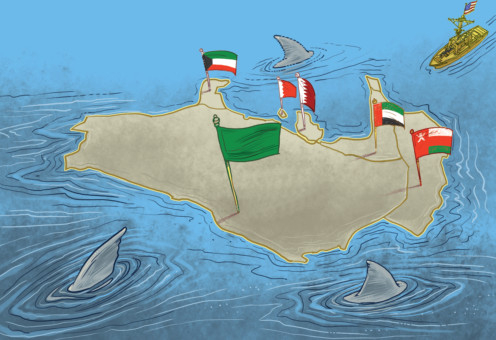
The Gulf Cooperation Council (GCC) is reassessing its relationship with the US after the twin blows of the American refusal to honour its “red line” over the Syrian governments gassing of its civilians and in the light of the US using secret talks to develop the interim agreement with the Iranians over their nuclear programme.
These two actions have deeply troubled the six members of the GCC, who still regard the US as their premier military ally. This is why the GCC wants access to the P5+1 (US, Britain, France, Russia, China + Germany) talks with Iran, as was suggested by all the GCC government officials who spoke at the Manama Dialogue this week in Bahrain, organised by the International Institute of Strategic Studies (IISS).
Over the past two years, after watching the US back Nato’s vigorous engagement in Libya, it has been a shock for many Arabs — including the Saudis and Qataris, who had led support for the Syrian opposition — to see the world’s superpower refuse to back the initially secular opposition movement to Bashar Al Assad.
And when Barack Obama refused to bomb Syrian government sites after it had gassed hundreds of its own population, the vast majority of Arab people felt that the US had betrayed its own principles. The US had promised to act if chemical weapons were used, but it failed to do so. This was a crunch moment when America’s honour was questioned across the Middle East, as everyone felt a deep sympathy for the Syrians being forced to live through the terrible conditions without any substantial international action to stop the war.
In addition, it was an obvious worry that if the US would not intervene in such a clear case, after it had promised to do so, there were some serious implications for every Arab state with military or security understandings with the US. Many Arab states have been forced to reassess any promise given by the Americans as just empty words.
Iran secrets
In this situation, it was gravely worrying for GCC member states to find that the US had been pursuing secret talks with Iran for almost a year before they become public at the recent round of P5+1 talks in Geneva. The GCC member states were deeply concerned that the US was ready to make a private deal with Iran that might well let Iran off the hook with a deal based solely on its nuclear arrangements.
The GCC is very concerned about Iran’s political adventurism throughout the region. GCC diplomats regularly repeat the list: Iran is sponsoring Shiite militias in Iraq; working with Al Houthi rebels in Yemen; supporting the opposition in Bahrain; offering military and economic help to the Al Assad regime in Syria; enjoying a very close relationship with Hezbollah in Lebanon, which includes sending Hezbollah forces to fight for the Syrian government. And there is a lot more when one looks deeply.
The GCC wants to make sure that despite this destabilisation, the US does not come to a private agreement with Iran over its nuclear programme, stop all the sanctions and then watch the American companies clean up in the rush to reinvest in Iran, where its industries desperately need to catch up with the outside world.
The Obama administration has been concentrating on how to get the Iranian deal and has not paid enough attention to the GCC’s fears. It has just woken up to this problem, but it needs to do a lot more than sending Defence Secretary Chuck Hagel to make a lacklustre speech at the Manama Dialogue, even if he promised the US would remain committed to the Gulf, offered to sell a missile defence system to the GCC (apparently not to the member states, but to the GCC itself) and suggested an annual US-GCC defence ministers’ conference.
No big deal
However, GCC fears of a new world order may be exaggerated as it is unlikely that the US relationship with Iran can move quickly to a more trusting basis. A useful blast of reality was aimed at the six-month interim deal by Gary Samore of the Kennedy School of Government at Harvard, who, during 2009 to 2013, spoke with considerable authority as he was Obama’s White House coordinator for arms control and weapons of mass destruction.
“The agreement is useful but small and most of the commentary about it is vastly exaggerated,” said Samore, talking at the Manama Dialogue this week. “It is not a breakthrough, but it is not a blunder. It is a truce and it is reversible.”
Samore was clear that he did not expect the six-month period to lead any breakthrough. “[Iranian President] Hassan Rouhani insists on industrial scale enrichment and Obama cannot let that continue and even if he wanted it, Congress would not agree. Therefore, the six-month period will not succeed. But neither side wants the deal to collapse. So a new six-month interim agreement will come and a continual roll-over of such deals may continue for some time.”
Only time will tell.







